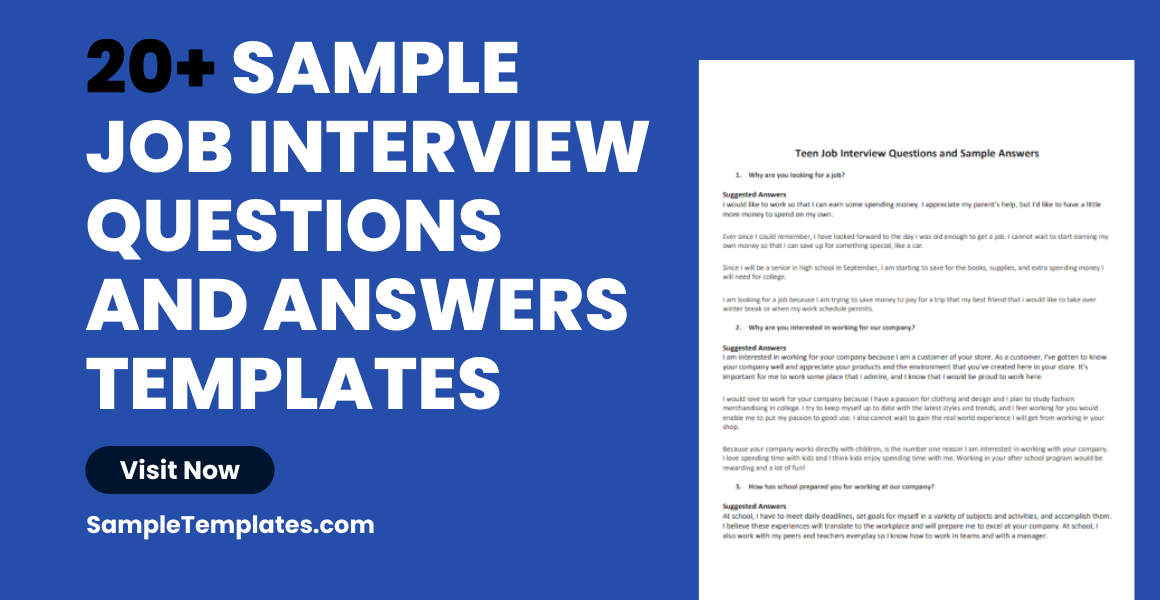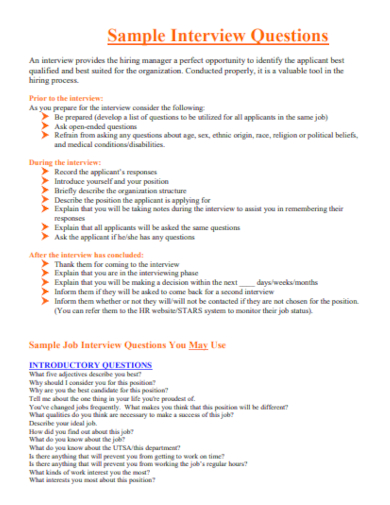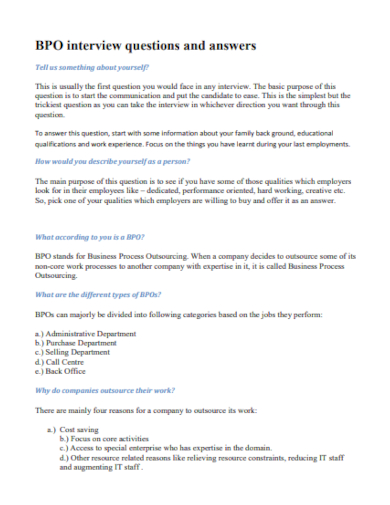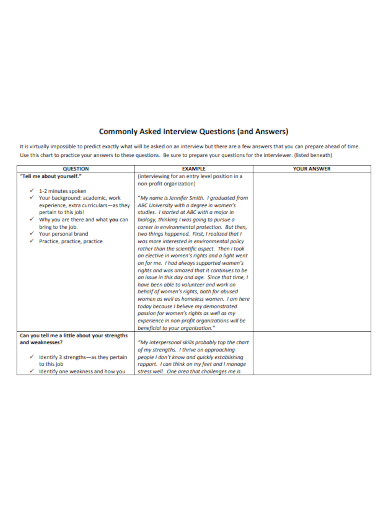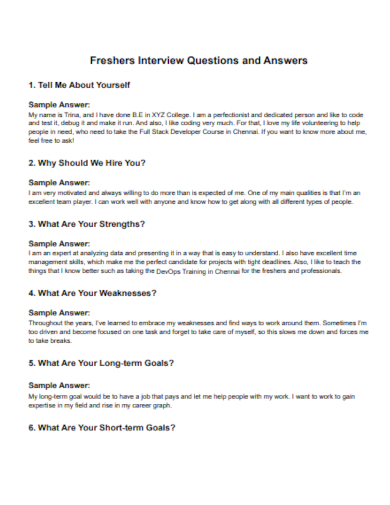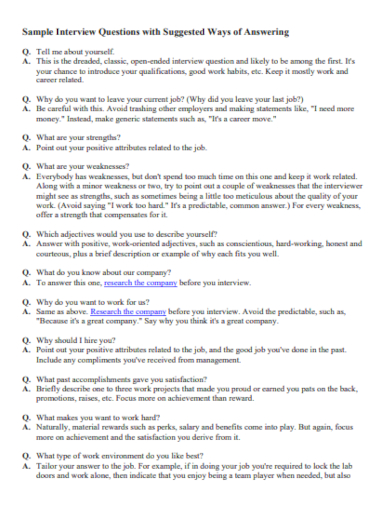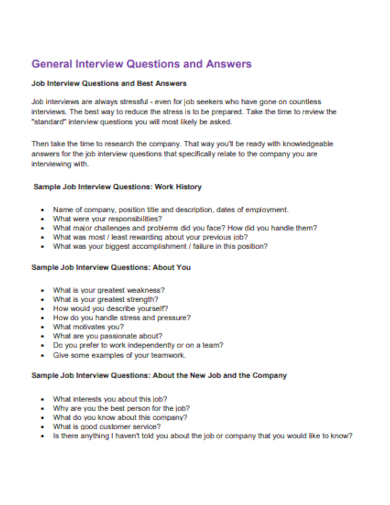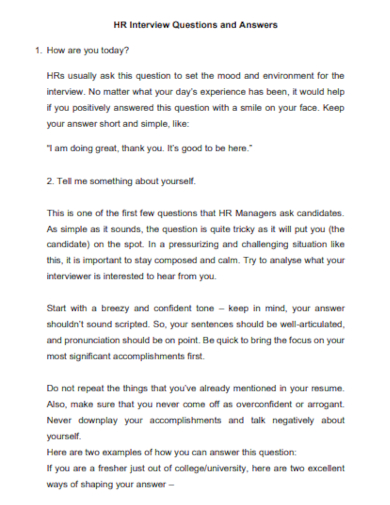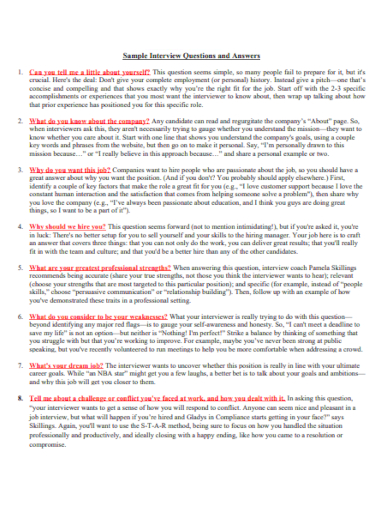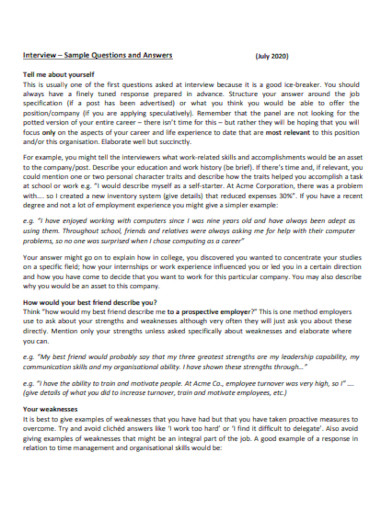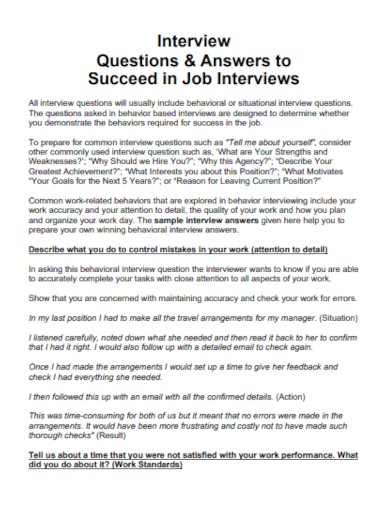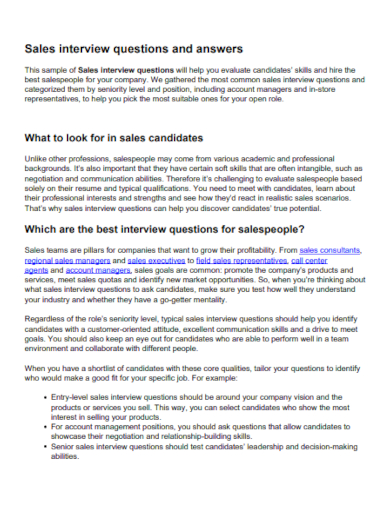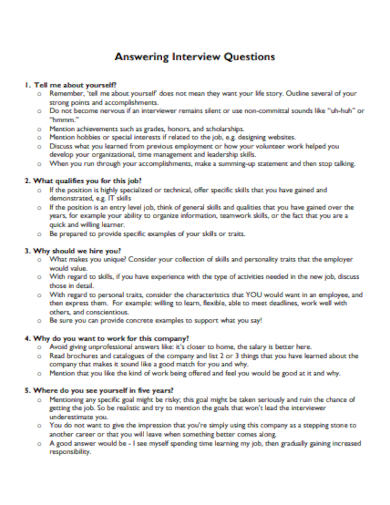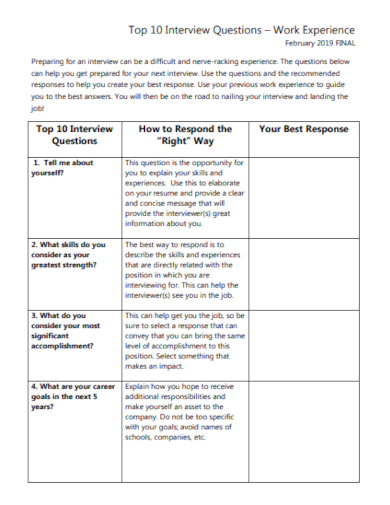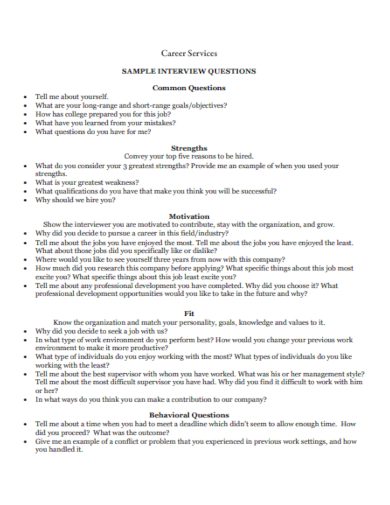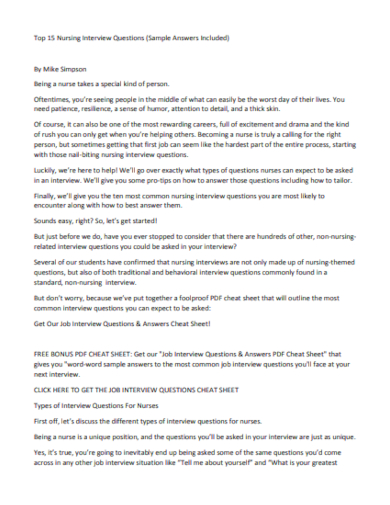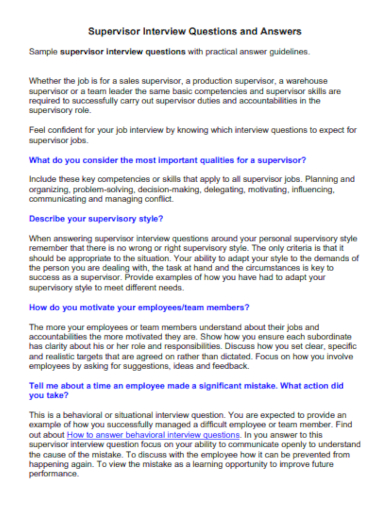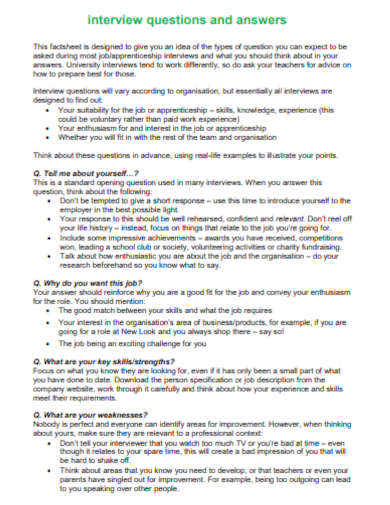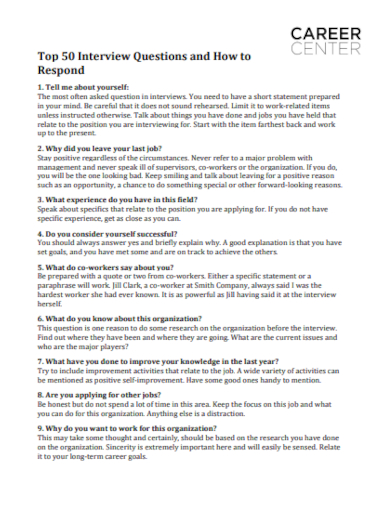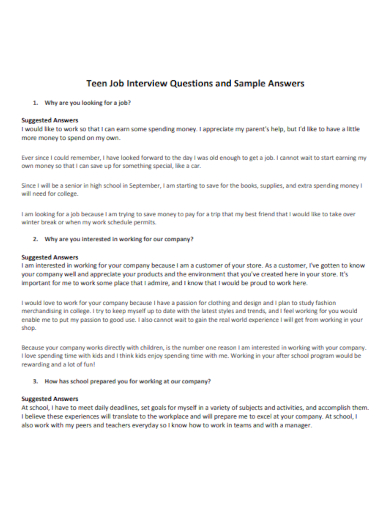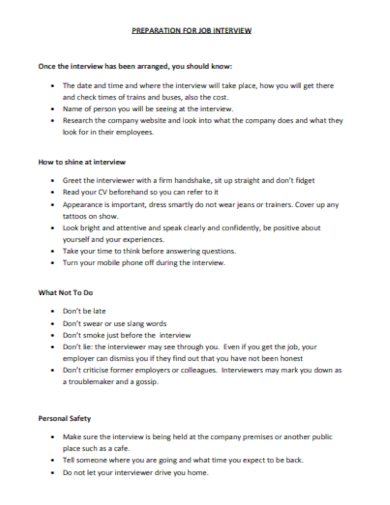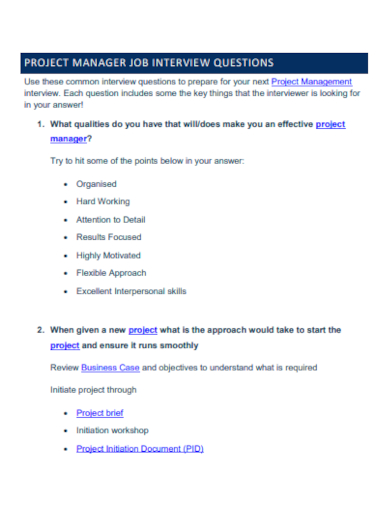Securing that dream job begins with acing the interview, and the key to that lies in preparation. Dive into our comprehensive guide on sample job interview questions and answers to gain an edge over other candidates. Here, we unravel the most common questions posed by hiring managers and offer expert insights into crafting compelling responses. Whether you’re a fresh graduate or a seasoned professional, these tailored tips will equip you to impress and increase your chances of landing the role. Let’s get started!
20+ Job Interview Questions and Answers Samples
1. Job Interview Question and Answer Template
2. BPO Job Interview Questions and Answers
3. Common Job Interview Question and Answer
4. Freshers Job Interview Question and Answer
5. Standard Job Interview Question and Answer
6. General Job Interview Question and Answer
7. HR Job Interview Question and Answer
Job Interview Questions, Answers, and Tips To Prepare
The job interview – a hurdle every professional must overcome to reach their career aspirations. Whether you’re a recent graduate diving into the job market or a seasoned executive exploring new horizons, acing the interview is critical. But fret not, with the right preparation and approach, you can turn this daunting task into a smooth sail. Here’s a comprehensive guide to arm you with sample questions, insightful answers, and valuable tips for the big day.
Common Job Interview Questions & Suggested Answers:
Tell me about yourself.
Tip: Keep it professional, not personal. Highlight key moments in your career, significant achievements, and your sample goals.
Sample Answer: I have over five years of experience in digital marketing, where I’ve led multiple campaigns for high-profile clients. My expertise lies in SEO and content creation, and I’m looking to further enhance my skills in a managerial role.
Why should we hire you?
Tip: Address how your skills align with the job description and how you can add value.
Sample Answer: Apart from my extensive experience in sales, I’ve consistently surpassed quotas and introduced strategies that boosted overall team performance by 20%. I believe my proactive approach will be beneficial for your company.
Describe a challenge you faced and how you overcame it.
Tip: Use the STAR method (Situation, Task, Action, Result) to frame your response.
Sample Answer: “In my previous role as a project manager, our team (Situation) was falling behind schedule (Task). I introduced agile methodologies, ensuring streamlined communication and effective task delegation (Action). As a result, we not only met the deadline but also increased our overall efficiency by 15% (Result).”
Tips to Prepare for the Interview:
Research is Your Best Friend: Before you step into the interview room, ensure you’ve researched the company, its culture, recent news, and its competitors. Tailoring your answers with this knowledge can set you apart.
Practice Makes Perfect: Enlist a friend or use mirror practice to rehearse your answers. This not only helps in refining your answers but also boosts your confidence.
Dress the Part: Wearing appropriate attire for the role you’re applying for can make a huge difference. When in doubt, it’s better to be slightly overdressed than underdressed.
Ask Questions: An interview is a two-way street. Prepare thoughtful questions to ask at the end of the interview. It shows your eagerness and interest in the role.
Follow-up: A simple ‘thank you’ email after the interview can leave a positive impression and demonstrate your professionalism.
While the thought of an interview might be intimidating, the right preparation can greatly increase your chances of success. Familiarize yourself with potential questions, practice your responses, and stay updated with industry trends. Remember, every interview, regardless of its outcome, is an opportunity to learn and grow. So take a deep breath, believe in your capabilities, and put your best foot forward. Good luck!
8. Simple Job Interview Question and Answer
9. Job Interview Question and Answer Example
10. Work Job Interview Question and Answer
11. Sales Job Interview Question and Answer
12. Job Interview Question and Answer Format
13. Job Experience Interview Questions and Answers
14. Job Service Interview Questions and Answers
The 10 Most Asked Interview Questions
Job interviews can be unpredictable, but certain questions have stood the test of time and remain popular across industries and roles. These questions provide employers with insights into your personality, work habits, skills, and potential fit within the company. Preparing for these can give you a considerable advantage in the interview process. Let’s dive into the ten most frequently asked interview questions and understand the intention behind each.
Tell me about yourself.
This open-ended question is a way for interviewers to assess your self-awareness, confidence, and communication skills. While it may seem broad, it’s best to focus on your professional journey, key achievements, and career goals.
How did you hear about this position?
This helps employers gauge the effectiveness of their recruitment channels and ascertain your interest level. Whether it’s through a job portal, company website, or referral, be honest and specific.
Why do you want to work here?
Interviewers are looking for candidates who resonate with the company’s mission and values. Research the company thoroughly and tailor your answer to show genuine interest.
Why should we hire you?
This is your chance to sell yourself. Highlight your unique skills, experiences, and how they align perfectly with the job description. Showcase how you can add value to the team and the company.
What is your greatest professional strength?
Here, interviewers are keen to understand if your strengths align with the job’s requirements. Be sure to provide examples of how you’ve leveraged these strengths in previous roles.
Can you describe a challenge you’ve faced and how you dealt with it?
This question aims to assess your problem-solving abilities and resilience. Use the STAR method (Situation, Task, Action, Result) to structure your answer effectively.
Where do you see yourself in 5 years?
Employers want to understand your long-term aspirations to see if there’s alignment with the company’s growth and direction. While it’s good to show ambition, ensure your answer also displays commitment and loyalty.
What’s your biggest weakness?
This tricky question assesses your self-awareness and honesty. Choose a genuine weakness, but also discuss the steps you’re taking to improve upon it.
How do you handle stress or pressure?
Every job comes with its challenges. Interviewers want to understand your coping mechanisms and ensure you remain productive even during tough times. Provide specific examples or techniques you’ve employed in the past.
Do you have any questions for us?
This isn’t just a formality. It’s an opportunity to demonstrate your interest and eagerness. Prepare thoughtful questions that delve deeper into the role, team dynamics, or company culture.
In summary, while each interview might have its unique set of questions tailored to specific roles, these ten form the backbone of many interview processes. Preparing solid answers for them not only builds confidence but also ensures you leave a lasting impression on your prospective employer. Remember, authenticity is key; rehearsed answers are great, but they should always reflect your true beliefs and experiences.
15. Nursing Job Interview Questions and Answers
16. Retail Supervisor Job Interview Questions and Answers
17. Job Interview Questions and Answers in PDF
18. Job Career Interview Questions and Answers
19. Teen Job Interview Questions and Answers
20. Preparation for Job Interview Questions and Answers
21. Project Manager Interview Questions and Answers
What Should Be Avoided During an Interview?
A job interview is a pivotal moment in one’s professional journey, a make-or-break opportunity. While much focus is often given to what should be done right, it’s equally crucial to recognize and avoid potential pitfalls. Let’s delve into behaviors and responses that can jeopardize your chances during an interview.
Being Unprepared:
Nothing screams “I’m not serious about this job” louder than being unprepared. This includes not knowing about the company, the role you’re interviewing for, or having rehearsed answers for common questions.
Arriving Late:
Punctuality is a reflection of your professionalism and respect for others’ time. Always aim to arrive a little earlier to account for any unforeseen delays.
Over-sharing or Rambling:
While it’s essential to be open during an interview, going into long-winded personal stories or irrelevant details can be off-putting. Stick to concise, relevant information.
Speaking Negatively About Previous Employers:
Regardless of past experiences, bad-mouthing previous employers or colleagues reflects poorly on your professionalism and can make interviewers wary of potential future complaints about their company.
Using Fillers Excessively:
Constantly saying um, uh, you know, etc., can distract from your message and indicate a lack of confidence or clarity. Practicing can help reduce these fillers.
Not Asking Questions:
Not having any questions can signal a lack of enthusiasm or interest in the role. Always prepare a few thoughtful questions that demonstrate your eagerness to understand the company and position better.
Dressing Inappropriately:
Your attire should match the company’s culture and the position you’re applying for. When in doubt, it’s better to be slightly overdressed.
Exhibiting Poor Body Language:
Avoiding eye contact, giving a weak handshake, fidgeting, or slouching can send negative signals. Positive body language can help convey confidence and enthusiasm.
Checking Your Phone:
Glancing at your phone or, worse, texting during an interview is a glaring sign of disrespect and lack of interest. It’s best to turn off or silence your phone and store it away.
Being Dishonest:
Always be truthful. Embellishing your skills or achievements can backfire, either during the background check or when you’re unable to fulfill tasks post-hiring.
Using Too Much Jargon:
While industry-specific terms can showcase your expertise, overusing them, especially when they’re not asked for, can come off as pretentious or exclusionary.
Not Following Up Post-Interview:
While this doesn’t fall strictly within the interview, failing to send a thank-you note or email can be a missed opportunity to reinforce your interest in the role.
In essence, an interview is not just an assessment of your skills but also an evaluation of your fit within the company culture. Avoiding these pitfalls, combined with the right preparation, can significantly improve your chances of making a lasting, positive impression. Always remember, the goal is to present the best authentic version of yourself.
Related Posts
Sample Meeting Minutes Templates
Presentation Speech Samples & Templates
Ukulele Chord Chart Samples & Templates
Retirement Speech Samples & Templates
Weekly Schedule Samples & Templates
Contractual Agreement Samples & Templates
FREE 9+ Amazing Sample Church Bulletin Templates in PSD | PDF
Sample Business Card Templates
Sample Cashier Job Descriptions
Questionnaire Samples
FREE 10+ Sample HR Resource Templates in PDF
FREE 10+ HR Consulting Business Plan Samples in MS Word | Google Docs | Pages | PDF
FREE 49+ Sample Job Descriptions in PDF | MS Word
FREE 16+ Nonprofit Budget Samples in PDF | MS Word | Excel | Google Docs | Google Sheets | Numbers | Pages
FREE 13+ Academic Calendar Templates in Google Docs | MS Word | Pages | PDF
